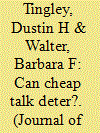| Srl | Item |
| 1 |
ID:
109936


|
|
|
|
|
| Publication |
2011.
|
| Summary/Abstract |
What effect does cheap talk have on behavior in an entry-deterrence game? We shed light on this question using incentivized laboratory experiments of the strategic interaction between defenders and potential entrants. Our results suggest that cheap talk can have a substantial impact on the behavior of both the target and the speaker. By sending costless threats to potential entrants, defenders are able to deter opponents in early periods of play. Moreover, after issuing threats, defenders become more eager to fight. We offer a number of different explanations for this behavior. These results bring fresh evidence about the potential importance of costless verbal communication to the field of international relations.
|
|
|
|
|
|
|
|
|
|
|
|
|
|
|
|
| 2 |
ID:
082923


|
|
|
|
|
| Publication |
2008.
|
| Summary/Abstract |
This article offers a novel contribution to the terrorism literature by using mathematical modeling and case studies to demonstrate how terrorist and extremist groups can utilize social service provision activities and anti-corruption campaigns instead of violent activities to gain support.The basic argument of the model is that terrorist groups will try to gain support by promising that they will be better distributors of resources than the current regime once they gain power and by promising that they will be less corrupt. However, because all organizations can freely make these promises, their words are cheap talk, and the general population should ignore them. To overcome this problem, organizations must offer a costly signal. Provision of social goods and implementation of explicit anti-corruption campaigns before taking power serves as such a signal. As the United States government and its allies widen their "war on terrorism," they must consider the ramifications of social service provision and anti-corruption activities, which are common, effective, and potentially useful for increasing the probability of group success.
|
|
|
|
|
|
|
|
|
|
|
|
|
|
|
|
| 3 |
ID:
083748


|
|
|
|
|
| Publication |
2008.
|
| Summary/Abstract |
The authors investigate the strategic rationale behind the message sent by Osama bin Laden on the eve of the 2004 U.S. Presidential elections. They model this situation as a signaling game in which a population of receivers takes a binary choice, the outcome is decided by majority rule, sender and receivers have conflicting interests, and there is uncertainty about both players' degree of rationality. They characterize the structure of the sequential equilibria of the game as a function of the parameters governing the uncertainty and find that in all pure strategy equilibria, the outcome most preferred by the rational sender is chosen. An explanation of the above-mentioned events relies crucially on the relative likelihood of rational and naive players: If a sufficient departure from full rationality of the electorate is posited, then our model suggests that bin Laden's pre-electoral message succeeded in tilting the race toward his preferred outcome.
|
|
|
|
|
|
|
|
|
|
|
|
|
|
|
|
| 4 |
ID:
172309


|
|
|
|
|
| Summary/Abstract |
This essay raises the question whether citizens in the digital age can learn from how credibility is treated in international negotiations. Negotiators face problems both in attempting to send credible signals and in making credibility assessments of received signals. Several studies, starting with Schelling’s seminal analysis of commitments, indicate that credible signals are those that are somehow costly to the sender. Contributions to our understanding of how recipients make credibility assessments include Jervis’s distinction between signals (with no inherent credibility) and indices (believed to be untainted by deception). The most general conclusion emerging from existing research is that there is no definitive, infallible solution to the problem of credibility, insofar as deception and misperception are intrinsic to all signaling systems. Today’s unfortunate combination of limited awareness of credibility problems, on the one hand, and technological advances facilitating deception, on the other, calls for intensified education as well as multidisciplinary research.
|
|
|
|
|
|
|
|
|
|
|
|
|
|
|
|